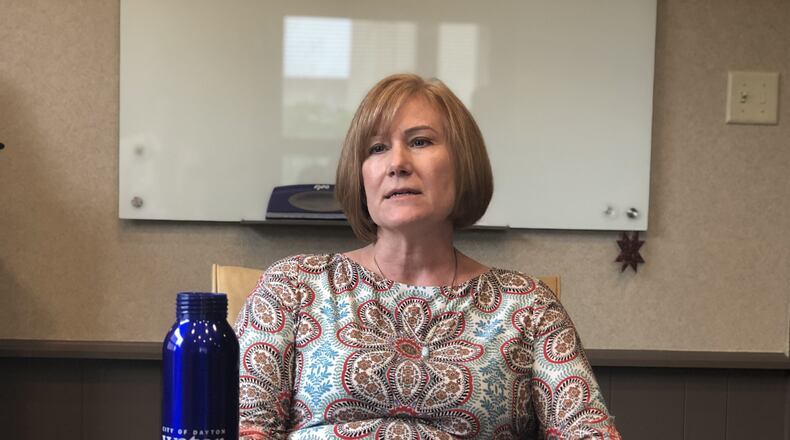The city should have to repay about $922,000 in federal funds, and HUD may provide nearly $900,000 in credit for funds that were not reimbursed because the city has been locked out of a federal grant repayment system, Jeffries said Friday.
MORE: Feds say Dayton may need to repay $3.2M
But HUD spokesman Brian Sullivan said the city’s letter to the agency fails to explain or justify the financial irregularities identified by the federal agency.
“The city has yet to answer the most basic questions about the use of these taxpayer dollars, but even it admits to misspending more than $900,000 of HOME funds,” he said.
Dayton City Manager Shelley Dickstein said the city has spent years and considerable resources improving its HOME program to be fully compliant moving forward, and HUD should distinguish between past problems and the current program administration that meets expectations.
“It is critical that we get to go forward, on behalf of the Dayton citizens, because these are precious funds that help address quality-of-life issues in our neighborhoods,” she said. “We’ve been working in good faith for two-plus years, trying to get us to the other side.”
EARLIER: Why a federal agency says Dayton spent $166K on ‘unallowable’ costs
In a July 5 letter, Dickstein responded to HUD’s monitoring report, which examined the city’s administration of the federal HOME program.
HUD’s monitoring report was released last month but was related to a July 2018 on-site visit in which staff reviewed the HOME program, which is supposed to create affordable housing for low-income households.
HUD’s report concluded Dayton’s program failed to comply with regulatory requirements and lacked records demonstrating that federal dollars went toward eligible projects and expenses.
HUD asked the city to produce records showing that more than $3.2 million in federal HOME funds was used for qualifying projects and expenses or repay the funds.
Past problems fixed, city says
Dickstein’s 14-page letter attempts to explain why the city should not be required to repay many of the questioned costs and projects and directs HUD to numerous invoices, agreements, project files and other documents intended to show the expenses were allowable.
TRENDING: Jay Minton back in coaching as college assistant
The city in the past failed to comply with some federal regulations and had inadequate record-keeping, but it has taken major steps to clean up the program and fix the problems, including replacing staff, hosting training, updating polices and procedures, undergoing a forensic audit and combing through files to ensure compliance, Dickstein said.
However, until 2016, the city received only clean monitoring reports from HUD, and the city would have avoided issues and would have been better prepared to answer the agency’s questions if they were raised at the time, and not years later, city officials said.
City staff has turned over and program rules and regulations have changed drastically over the years, Jeffries said. Still, she said, the city was able to produce evidence that should prove most funds were used for eligible costs.
The city’s analysis concluded it should only have to repay about $921,913 in federal funds because of missing documentation and other issues.
‘Not helping our community’
The city now needs HUD’s help to get back on track and access the reimbursement system, and the city still has not received its 2018 and 2019 HOME allocations, Jeffries said.
“We want HUD’s help to draw a thick line between what has happened in the past and how we can move forward and in full compliance,” Jeffries said. “Having all our staff resources tied up in trying to create a narrative for the past — when we weren’t here and don’t have the files to support — that’s not helping anyone, and it’s certainly not helping our community.”
MORE: Turner: Dayton’s ‘mismanagement’ puts millions of federal dollars at risk
HUD revoked the city’s access to its grant repayment system in late 2017, and the city has been unable to reimburse itself for expenses related to HOME-eligible projects since that time, Jeffries said.
The city already lost about $898,950 in HOME funds because of the lock out, which are gone forever, and the city needs to regain access for project reimbursements and to clean up the issues HUD identified in its report, Jeffries said.
Also, the city has asked HUD to reduce its repayment amount by $898,950, which was wiped away because of the lock out.
The city also has asked HUD to OK a voluntary grant reduction to repay the HOME program.
‘Seemingly irrelevant’ documents
But Sullivan, the HUD spokesman, said the city’s response to its report was to dump thousands of “seemingly irrelevant” documents on the agency.
“It submitted thousands of pages of documentation, but it’s unclear that any of it addresses the main concern here – what happened to the money?” he said.
The city of Dayton had inadequate and inaccurate reporting, and there were many revisions to vouchers in the grant payment system that could not be explained or justified, according to the monitoring report, signed by Stanley Gimont, HUD’s deputy assistant secretary for grant programs.
Dayton “failed to manage its HOME program funds in a manner that meets basic grant administration and financial management requirements,” the report states.
STAYING WITH THE STORY
The Dayton Daily News first reported in 2017 that the city forfeited about $477,000 in federal funds for missing important deadlines and has continued to investigate the problems, revealing earlier this year a potential $3.2 million penalty for Dayton.
About the Author

